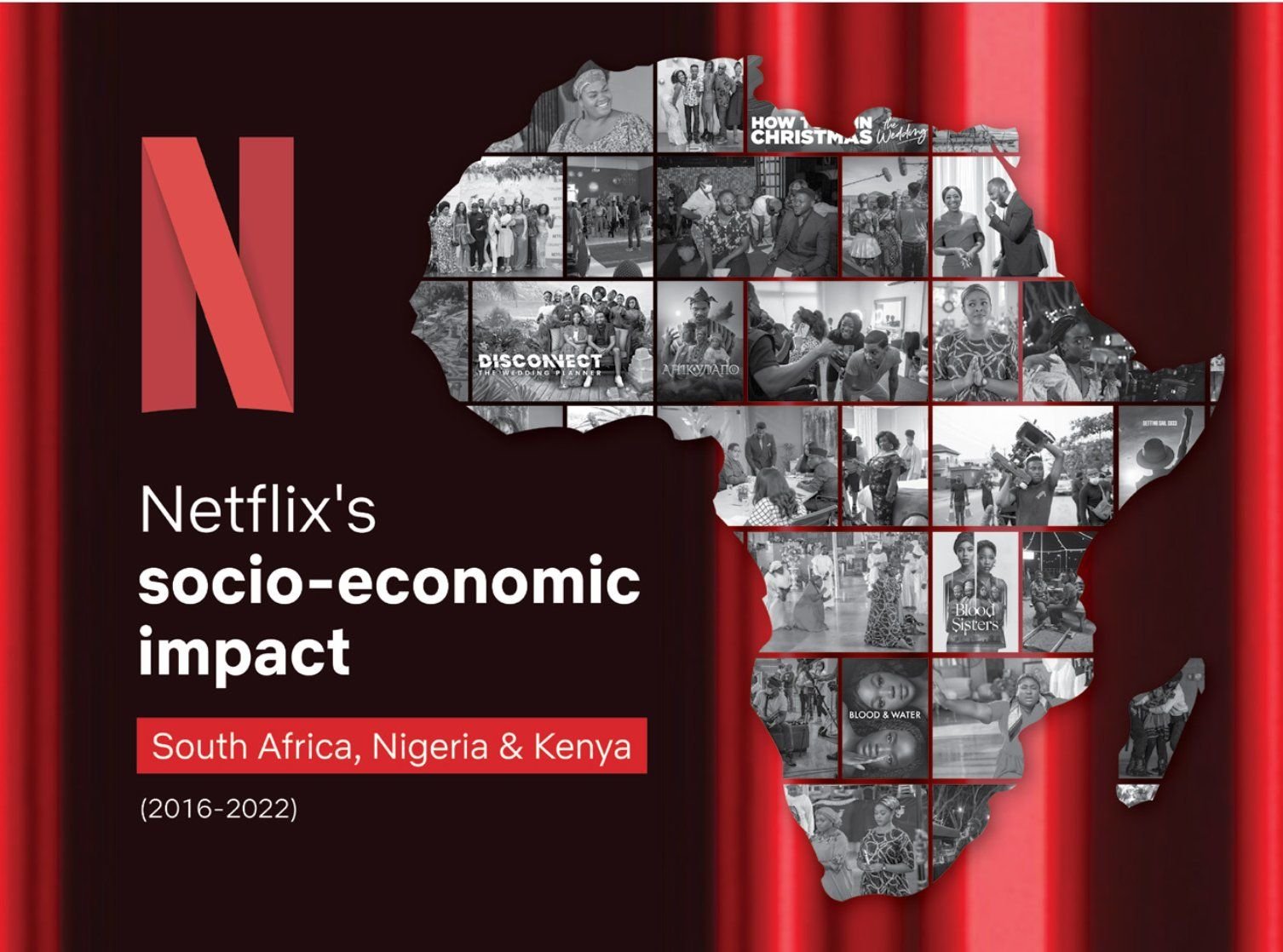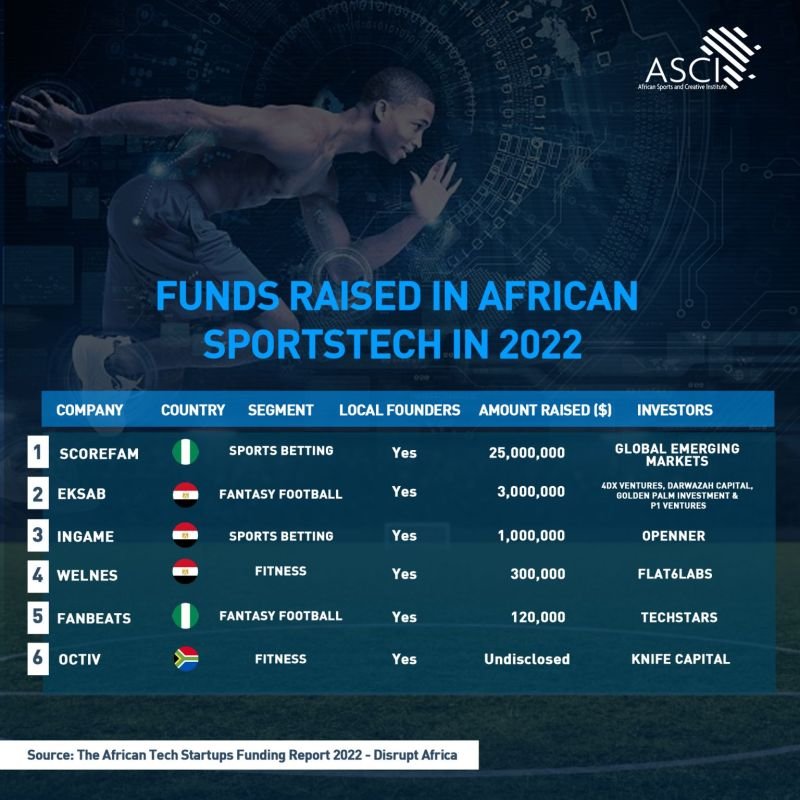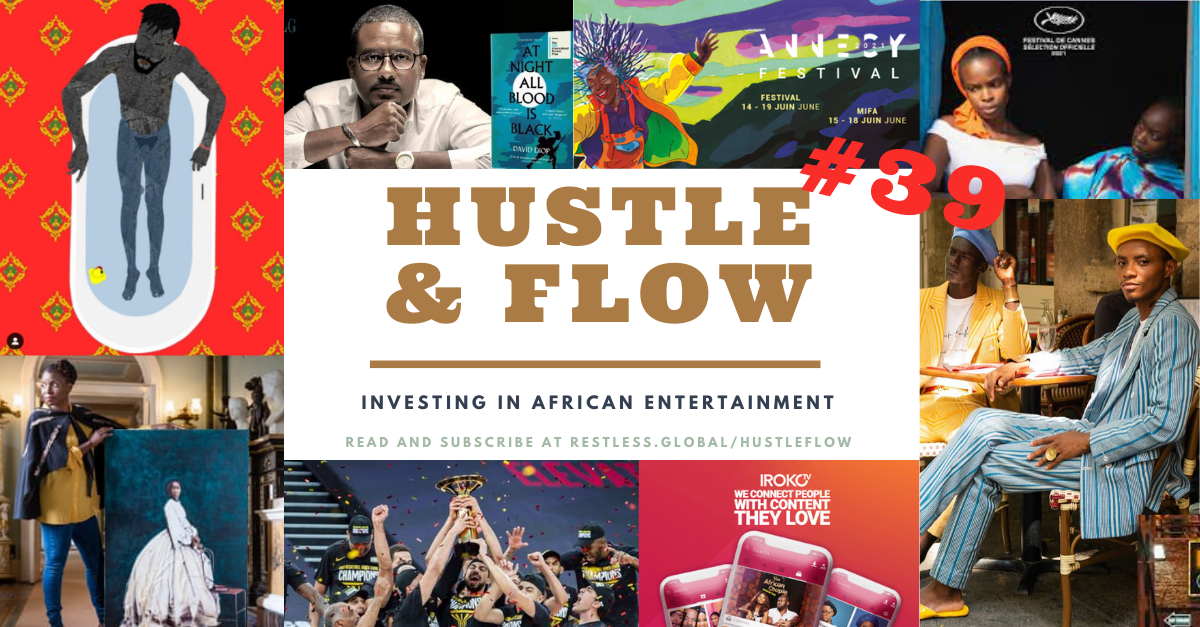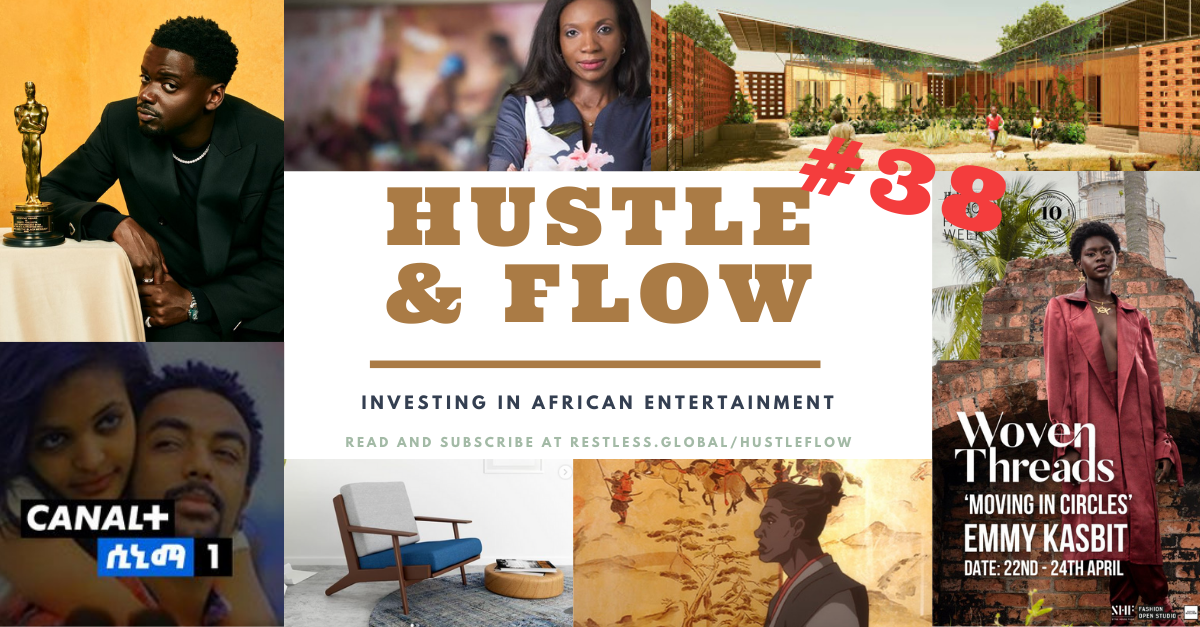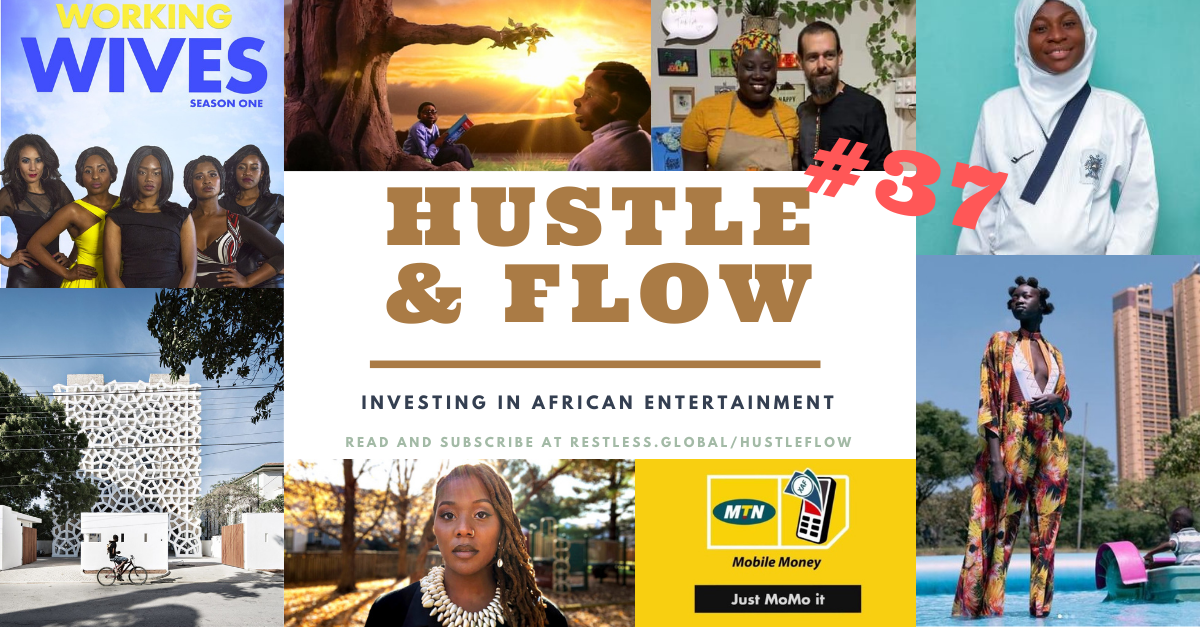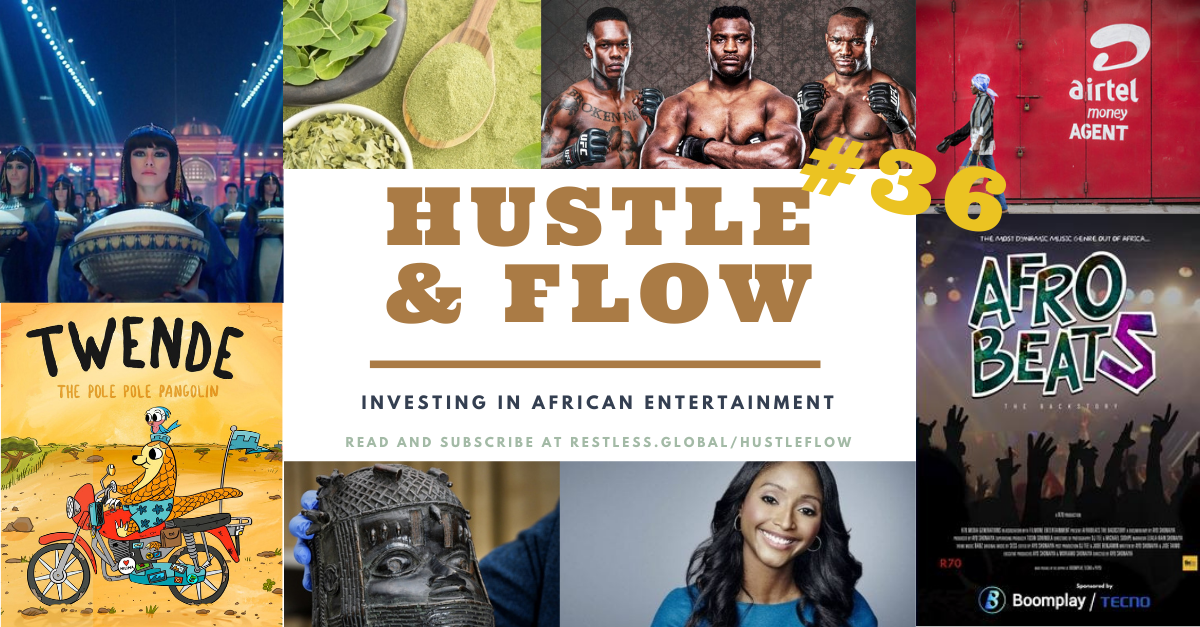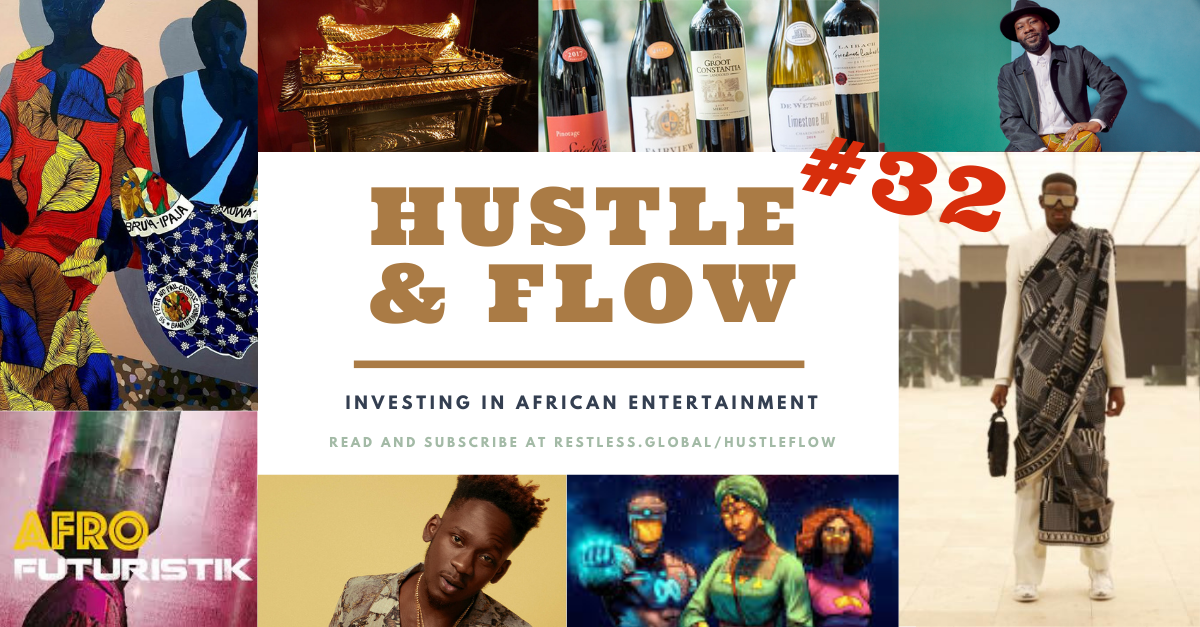(c) Netflix, Africa socio-economic report 2016-2022
The biggest news this April was the release by Netflix of a report analyzing the impact of their investments in Africa in the past 6 years (read more below). The reveal that the platform had spent $175 million on the continent got the industry buzzing.
That's certainly not nothing, but... last week the streamer announced that it planned to invest $2.5 billion in South Korea over the next 4 years. If we compare these numbers to both regions' populations, they represent a $12 investment per person in South Korea versus $0,025 per person in Sub-Saharan Africa. There is a long way to go.
Last month also saw the announcement of two ground-breaking deals between African talents and Hollywood studios. Both partnerships took years to materialize and were shepherded by CAA's Head of Africa Ozi Menakaya, who has more of that good stuff up his sleeve.
On April 18, I attended MIPTV in Cannes and had the opportunity to speak about new opportunities in African film finance at the event's co-production breakfast. I was also lucky to get a sneak peak of South African animation studio Triggerfish's 'Kizazi Moto' (Generation Fire) scifi anthology project for Disney, which will be released on Disney+ over the summer. You won't want to miss that one.
Before I roll out the rest of this newsletter, let us bid farewell to Calypso singer, actor and civil rights activist Harry Belafonte, who died on April 25 at 96 years old. In the 1960s, Belafonte used his wealth and fame to bring American attention to the apartheid regime in South Africa, playing a crucial role in promoting the careers of the South African musicians Miriam Makeba and Hugh Masekela.
Off we go for HUSTLE & FLOW #45:
STREAMING
💡 Six years after making its grand entrance in Africa, Netflix released an enlightening report about its socio-economic impact on the continent.
The 44-pages document zooms in on Netflix's 3 focus markets so far: South Africa, Nigeria and Kenya.
Here's the gist:
💵 Netflix invested a total of $175 million in South Africa, Nigeria and Kenya combined between 2016 and 2022. That's about $29 million per year of operation.
🇿🇦 South Africa received the bulk of this investment ($125 million), with 173 titles licensed and 16 originals commissioned.
➡️ The single largest investment so far has been in 'One Piece', a live-action adaptation of the Japanese manga and anime series by the same name, which is set to be released this year. Netflix brought the project to South Africa and fully financed the $54 million production budget.
🇳🇬 In Nigeria, Netflix invested $23.6 million to license 283 titles and commission 3 originals.
🤔 We can assume that the remaining $28.4 million were spent on licensing content from the rest of the continent, producing 2 originals in Kenya, supporting various capacity building initiatives, and on other operational or overhead costs for their Africa operations.
🚀 Netflix estimates that its activities over the past 6 years helped create or sustain 12,000 jobs and generate $218 million in GDP revenue.
🌍 Netflix has been instrumental in bringing international exposure to African filmmakers and their stories. Out of the 9 local titles that were the most watched outside of Africa, 6 were from South Africa, 2 from Nigeria and 1 from Kenya.
➡️ The above list is yet to be updated with the recent South African hit series 'Unseen' from Gambit Films. Gambit is also behind the 3 seasons of 'Blood and Water' which currently hold the top 3 spots on the list.
🎓 Netflix also invests seriously in capacity building through training workshops, donations to industry bodies, mentorships, on-the-job training, and educational grants.
➡️ In particular, the $1 million Netflix Fund for Creative Equity provides grants for students across Southern, East and West Africa to pursue film studies.
🔥 Finally, another important takeaway that comes up a few times in this report:
The streaming giant remarks that the current media production incentives across the continent are not enough to stimulate the creative sector, and that financial constraints limit the industry's evolution.
If Netflix says it...
👋🏿 Meanwhile, Mansa, a new free, ad-supported streaming platform focused on global Black culture, also launched last month.
🚀 Co-founded by actors David Oyelowo, Nate Parker and Chiké Okonkwo, alongside tech entrepreneur and film financier Zak Tanjeloff, the new platform is launching with $8M in seed funding.
💵 Investors include MaC Venture Capital, WndrCo, Mike Novogratz’s Galaxy Investment Partners, Base Ventures, and other big names such as NBA star and Sacramento mayor Kevin Johnson, and Wemimo Abbey, co-founder of the Softbank-backed unicorn Esusu.
🤔 Mansa is not the first streaming platform to focus on Black content in the highly competitive VOD space: BET+, ALLBLK, Black Cinema+, Brown Sugar, Black Box Movies, Black & Sexy TV, kweliTV and AfroLandTV are just a few examples of services targeting this audience.
⏱ But Mansa's co-founders hope that their free, ad-supported model will make the difference. According to Nielsen, Black audiences make up nearly 40% of the view time on major ad-supported streaming services like Tubi (39%) and Pluto TV (36%).
🎞 Mansa is launching with some 1,500 hours of content, including longform and shortform film and TV shows, free ad-supported streaming (FAST) channels and video podcasts.
🤳🏿 Targeting Gen Z and younger millennials, Mansa also incorporates features that showcase user-generated content, such as a feed of trending videos from YouTube, TikTok and Instagram, and another one called “Watch Out Loud,” which lets users join a watch party (or “Room”) and stream movies and TV shows alongside creators and independent filmmakers.
The company is also working on original titles through its Mansa Originals division, and plans to eventually launch original short-form content made by smaller creators.
💪🏿 David Oyelowo has been a long-time advocate of Black and African ownership of their own stories, platforms, and audiences. “We aim to change the paradigm around creator fairness, solving to address long felt challenges in the industry through addressing ownership, transparency and community on a foundational level," he said.
🌍 Mansa plans to launch in the US during the second quarter of 2023 before expanding internationally, first into Africa and then throughout the diaspora.
COMIC BOOKS
🦸🏾A home-grown Nigerian superhero universe is getting the Hollywood treatment.
🔥 Universal Studios Hollywood's TV arm UCP has signed with Nigerian online comic book company Comic Republic to develop a slate of TV series based on characters from its popular Vanguards Universe.
⚡️ Founded in 2013 by Jide Martin, Comic Republic is the creator of the Vanguards Universe, which revolves around what happens when members of the first race — humanity’s self-proclaimed gods — reunite to punish the people of Lagos for the sins of the Guardian. Those who have decided to be heroes and protectors are forced to become humankind’s first line of defense, to serve and to protect, to be Vanguards.
🤝 The deal, which gives UCP access to 14 Vanguards Universe characters, has been more than one year in the making and was brokered by CAA's Ozi Menakaya. Ozi spotted Comic Republic 4 years ago.
💡 I often get asked what advice I would give to aspiring writers and filmmakers on the continent. That is my answer:
✅ Spend time crafting your characters and storylines, and building your IP. Go deep into your characters' psychology and narrative arcs. Make them real and relatable.
✅ Share your work with the world, even if it is in-progress.
⛔️ Don't keep it for yourself. Don't be scared of having your idea stolen -- ideas have no real value, execution over the long term is what matters.
✅ Gather feedback, learn, improve and iterate, building an engaged audience as you go.
✅ When your work is good enough, you will get noticed.
Jide Martin and his team have spent 10 years building their Vanguards Universe, and now they have a deal with Universal. Congratulations to them!
ANIMATION
🔥The teaser for Disney's animated anthology project 'Kizazi Moto' (Generation Fire) is out.
👏🏼 An impressive kick-off for this labor of love by South African studio Triggerfish Animation, who sourced, developed and produced these 10 wholly original scifi short films by 10 filmmakers from across the continent.
🤩 I was lucky to get a sneak peak and this is one very rare case where the full-length films are better than the trailer.
In case you had any doubt, this is what can be achieved when the proper resources are given to a well thought-out African project.
'Kizazi Moto' will premiere on Disney+ over the summer. Prepare to be amazed by how much African animation has progressed in such a short time.
FILM
🇨🇮 Started from Abidjan, now he's here.
🎥 French-Ivorian filmmaker Philippe Lacôte has signed on to direct "Killer Heat", a thriller starring Joseph Gordon-Levitt, Shailene Woodley and Richard Madden, for Amazon Prime.
🎞 Born in Abidjan, Lacôte is a veteran of African cinema. He started his career in the mid 1990s, directing and producing several projects between France, Ivory Coast, and Burkina Faso.
His first fiction feature film, "Run", premiered as part of the 'Un Certain Regard' selection at the Cannes Film Festival in 2014.
🏆 But it's his latest film, “Night of the Kings", which propelled him on the global stage in 2020. The film premiered at the 2020 Venice Film Festival and went on to win the Amplify Voices Award at the Toronto Film Festival.
😎 On the back of this success, Lacôte was signed by CAA's Ozi Menakaya, who helped him perform this very rare transition to Hollywood -- and to be tapped to direct a non-African-focused project.
Lacôte joins the very small circle of African directors to have achieved such a feat, and which includes:
🇰🇪 Kenya's Wanuri Kahiu ("Look both Ways" for Netflix)
🇳🇬 Nigeria's Akin Omotoso ("Rise" for Disney)
🇿🇦 South Africa's Neill Blomkamp ("Elysium" for TriStar and Sony Pictures) and
🇿🇦 Gavin Hood ("X-Men Origins: Wolverine" for Marvel).
"Killer Heat" begins production in May in Crete.
HERITAGE
✈️ 🌍 Africa's stolen artifacts are slowly making their way back to the continent. And that's a great opportunity for some countries' tourism industry.
Today, the majority of African artifacts in museums are held outside Africa. The most well-known of these artifacts are the Benin Bronzes, which were looted from Nigeria's Benin City by British soldiers in 1897. To learn more about this, I recommend reading Barnaby Philipps' great book 'Loot'.
Now, 88 years after Nigerian traditional ruler Oba Akenzua II championed the cause in 1935, former colonial powers are finally heeding the call for restitution.
🇳🇬 Last year, the United States, United Kingdom and Germany transferred the ownership of about 121 Benin artifacts to Nigeria.
🇧🇯 In the nearby Republic of Benin, 26 artifacts looted by France’s colonial troops were returned in November 2021.
💰 The impact of the restitution movement is not only important from an ethical, historical and cultural perspective - it also presents potentially huge economic benefits for African countries.
➡️ In parallel to the transfers, Nigeria and Benin have negotiated capacity building support from the returning countries to train local staff in museum management and conservation.
➡️ The return of the artworks is also attracting substantial investment in the countries' heritage and tourism infrastructure.
🏗 In Nigeria, Edo state is building a cultural district in Benin City, which will eventually include the Edo Royal Royal Museum, the Edo Museum of West African Arts (EMOWAA), a research and educational facility, and a mall.
The project is part of Edo state's tourism master plan, which sets the road map for the development of a tourism corridor connecting 72 different tourism sites including a wildlife park as well as cultural and natural sites. The Edo government is targeting $4.3 billion of tourism revenue in the next 10 years.
🏗 Meanwhile, the Republic of Benin has announced the creation of the Museum of the Epic of the Amazons and Kings of Dahomey in Abomey. The project includes the rehabilitation of four royal palaces that attracted $38 million in financing from Agence Française de Développement. Last year, a free exhibition in Cotonou of the returned artifacts attracted more than 200,000 visitors.
And this is just the beginning. An estimated 500,000 African artifacts are still held by museums and institutions in Europe alone.
MUSIC
🇳🇬 Burna Boy will make history once again when he becomes the first Nigerian artist to headline a U.S. stadium in July at New York's city Fields.
🌍 The global appeal of the 'African Giant' is taking Nigerian music further than ever before:
🗽 Just last April, be became the first Nigerian act to headline Madison Square Garden.
🏀 In February, he, Tems and Rema became the first artists to perform an all-Nigerian halftime show at the NBA All-Star game in Utah.
📈 Burna's most recent album, 'Love, Damini' peaked at No. 2 on Billboard‘s World Albums chart.
🌟 It also received a 2023 Grammy nomination for best global music album.
🥇 In total, Burna Boy has racked up 6 Grammy nominations and 1 win since 2020.
✈️ Later this year, besides New York his 'Love, Damini' world tour will also take him to Paris La Defense, London Stadium and Gelre Dome in Amsterdam.
⚽️ In June, the superstar is slated to co-headline the 2023 UEFA Champions League Final Kick Off Show in Istanbul.
The majority of Burna Boy's global fans probably do not understand his lyrics.
🎤 But interestingly, the 31-year-old Burna Boy is achieving this massive success while being the most outspoken of Nigeria's top music stars - openly criticizing the Nigerian government and sharing his pan-Africanist views:
“It has always been my vision to build a bridge between all Black people in all parts of the world through the music and performance. Music is the No. 1 messenger.”
SPORTS BUSINESS
🇺🇸 Can American football make headway in Africa?
🏈 The National Football League (NFL) traveled to Kenya in April to host a talent identification camp and an NFL Flag football showcase in Nairobi.
🏃🏿Twenty-nine prospects aged 16-21 from Cameroon, Kenya, Morocco, Nigeria and Senegal are taking part in a three-day NFL Combine-style camp with the hope of being spotted.
The best young players stand to win invites to join various NFL development programs and academies.
🚩 In parallel, the league is holding a Flag Football Showcase to introduce the game to young people from 10 schools across Nairobi and train local teachers.
So far unknown in Africa, flag football is a variant of American football where instead of tackling players to the ground, the defensive team must remove a flag or flag belt from the ball carrier.
🇬🇭 The NFL's Nairobi showcase is the second such event held in Africa by the American football league since the launch of its "NFL Africa" program last year in Ghana.
The league's development efforts in Ghana have led to the first Ghanaian youth NFL Flag football team competing in the NFL International Flag Football Championships in 2023 in Las Vegas. The Ghanaian team, despite only having learned the game a few months earlier, made it to the semi-finals.
🚀 Growing the NFL globally is a major strategic priority for the League, and with more than 125 players of African descent from 15 countries across the continent currently playing in the NFL, it is clear that Africa is a key source of talent.
However, whether the NFL will manage to build a homegrown audience for the sport in the land of football (soccer) and rugby remains to be seen.

